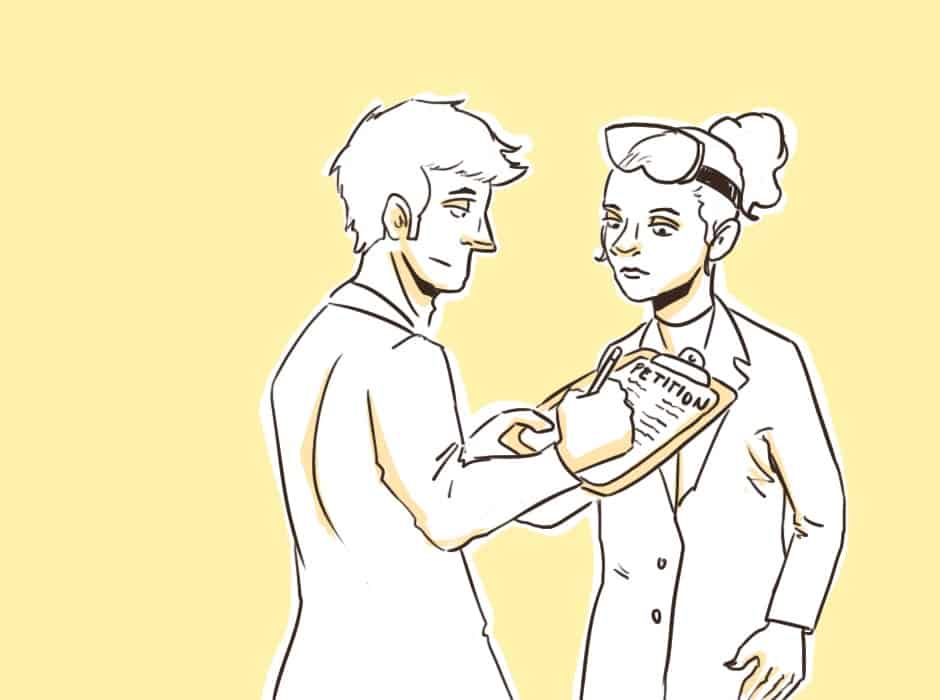Two hundred and fifteen Faculty of Medicine students have signed a petition in support of recommendations made by Ontario’s information and privacy commissioner, Ann Cavoukian, regarding police disclosure of suicide attempts.
The report, titled “Crossing the Line: The Indiscriminate Disclosure of Attempted Suicide Information to US Border Officials via CPIC,” called on police services in Ontario to cease the practice of routinely disclosing personal information relating to threats of suicide or attempted suicide through the Canadian Police Information Centre (CPIC), a central database for Canadian law enforcement agencies.
According to information released in 2011 by WikiLeaks, any information entered into the CPIC database is accessible to American authorities. The report also called on police services in Ontario to develop a process to enable individuals to seek to have any information on the CPIC related to a threat of suicide or attempted suicide removed.
The report cited one instance in which US customs agents turned a Canadian citizen away at Toronto’s Pearson Airport because she was hospitalized years before for clinical depression.
Faculty of Medicine students Phillip Gregoire, Varuna Prakash, Amirah Momen, Louai Musa, Lisa Jean Saldanha, Daniel Abrams, Patrick Steadman, and Mark Crawford spearheaded the initiative.
The petition was addressed to several high-ranking officials, including Prime Minister Stephen Harper, Toronto chief of police Bill Blair, and Toronto’s major mayoral candidates.
Gregoire emphasized the importance of municipal support. “The mayoral candidates are crucial in guiding the municipal services on this issue. It is up to them to lead the city to protect Torontonians from unfair disclosure of their private information,” he said.
Gregoire and three of his classmates also met with Cavoukian on June 6 to voice their concerns about the negative impact of the disclosure practices on access to emergency care.
“If a person had attempted suicide and had changed his or her mind after the attempt, the person might hesitate to contact emergency services [if] going to the US was important for their livelihood. They could also worry about how this information will appear in police record checks. This hesitation can have fatal consequences,” he said.
Gregoire also cited the Faculty of Medicine’s own admission policies as a relevant example. He explained that the medical school requests that police services do not send mental health information when performing vulnerable sector screening on applicants. This practice is part of an effort to eliminate discrimination against students based on mental health history.
In early June, Cavoukian filed a notice of application for judicial review with the Ontario Superior Court of Justice. The notice asked that the Toronto Police Service cease disclosure of suicide-related information to US officials.
Toronto Police spokesperson Mark Pugash told the Toronto Star that he fundamentally repudiated the legal action and argues that the information is necessary to their mandate. He explained that mental health data allows police to bring psychiatric assistance if persons with a history of threatening to commit suicide are involved in a potentially threatening situation. Gregoire expressed optimism that the judicial review will demonstrate the current policy to be a violation of Ontarians’ rights.
Cavoukian voiced her support for the petition, saying that the medical students reinforced her position on the issue.
“They agreed with my findings that discretion must be exercised before sensitive suicide-related mental health information may be shared with law enforcement agencies. The indiscriminate disclosure of such health information by the Toronto Police has the potential to ruin lives and must cease,” she said.
Vice-dean of undergraduate medical professions education Jay Rosenfield declined to comment on the university’s position, but expressed support for the students’ activism.
“The Faculty of Medicine does not make official statements on advocacy issues, but we congratulate our students on making their voices heard on this important issue,” Rosenfield said.
For his part, Gregoire expressed hope that the petition would lead to broader activism in the medical field. “Medical students, and all of the health profession students, are the future of Canada’s healthcare system. It is our duty to recognize policies that negatively impact the health of patients and do our best to change those policies. It is what Canadians expect from us, and I can only hope that we won’t let them down,” Gregoire said.
With files from the Toronto Star


